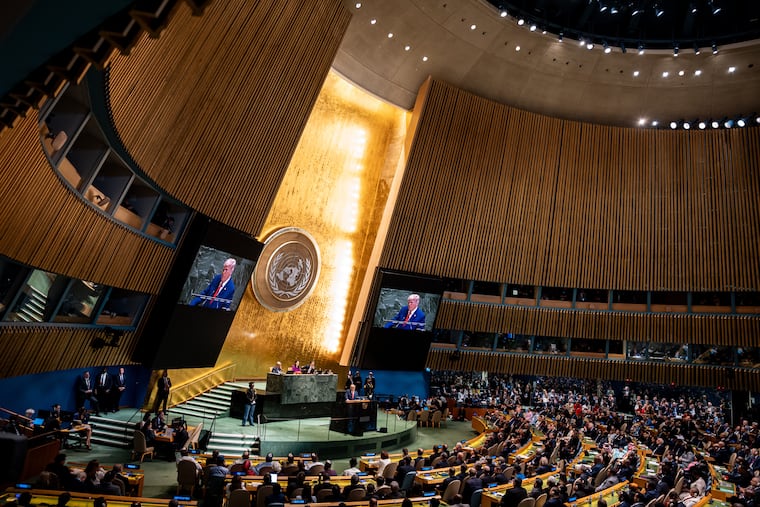
One of the painfully shameful aspects of President Donald Trump’s wholly absurd speech at the United Nations last week, was how he bragged about his administration’s immigration crackdown, and then suggested that other nations facing an influx of migrants should follow his lead.
Leave aside for a moment that the administration’s immigration actions have grown increasingly unpopular in the U.S., and that many of its core practices have been challenged as lawless and profoundly unconstitutional in U.S. courts.
Focus instead on this: our president just waxed ineloquent about an immigration policy that relies almost entirely on the practice of enforced disappearance — a grave human rights breach that, experts on international law assert, constitutes a crime against humanity according to the Rome Statute of the International Criminal Court.
Anonymized ICE agents arbitrarily detaining immigrants and noncitizen international students and academics in violation of constitutionally protected and judicially required due process seems to fit tidily within the United Nation’s definition of enforced disappearance.
So does transnationally disappearing people into prisons where they are subject to torture and held incommunicado, or to internally disappear them into U.S. detention centers where their whereabouts can be vanished from the ICE database at will (as recently happened to hundreds of detainees at “Alligator Alcatraz”) — effectively cutting them off from legal counsel and community support.
“Say it with me: Our government is forcibly disappearing people,” said Heidi Altman, the vice president of policy at the National Immigration Law Center.
“Most human rights experts feel that the Trump administration’s rendition of more than 200 Venezuelans to the CECOT torture gulag in El Salvador most cleanly met the definition,” Altman said. “But there are certainly many many other examples of stories and recent arrests that have the trappings of disappearances.”
Altman points to the treatment of the Merlos family who were recently released after weeks in Customs and Border Protection custody in Washington, as an illustration of that.
“Sometimes history doesn’t rhyme, it echoes,” a friend texted me recently. Boy, howdy. For those of us who’ve experienced authoritarianism first-hand in other countries, the warning signs of this administration’s despotic bent aren’t easily hand-waved away.
Enforced disappearances aren’t the only way the Trump administration is showing its authoritarian character, of course, but it is one with a deep resonance for me.
I grew up in Guatemala during that country’s 30-plus years of undeclared civil war, when more than 45,000 people were forcibly disappeared. I still clearly remember, after my family moved to the United States in the late 1970s, the day when then-President Jimmy Carter announced cuts in direct military aid to Guatemala in response to the repressive authoritarian regime’s extrajudicial killings, torture, and enforced disappearances.
I celebrated Carter’s actions openly — something I wouldn’t have been able to do if I were still living in Guatemala —because it represented not only his individual moral decency but, through him, our nation’s.
But Ronald Reagan reversed Carter’s focus on human rights as a fundamental tenet of foreign policy, and by the time Manuel Portillo, the director of community leadership at the Welcoming Center in Philadelphia, came to the U.S. from Guatemala roughly a decade after my family had, he was fleeing for his life from a country where authoritarianism — with U.S. support — had evolved into genocide.
“The abuse of power and the inclination toward a dictatorial style of government that we’re witnessing [in the U.S.] today is not just a matter of daily news: it’s a deeply personal wound for many of us,” Portillo told me via email.
“For those of us who lost members of our family at the hands of the Guatemalan military, as it continues to happen to people around the world these days, the echoes of that past are too real because we’ve seen this playbook before: the denigration of dissent and the glorification of one strongman’s ultimate and unquestionable authority, the weaponization of public institutions to persecute political enemies and the violent vilification of immigrant communities that have contributed so much to the success of the American economy.”
“No. These aren’t distant memories,” he added, “they’re warning screams, growing louder by the day.”
The difference between old-school authoritarians and new-school Trumpians is so vanishingly small, that I sometimes wonder whether the legal tools that have been used to try to secure justice in other countries might have to be employed here.
For example, the International Convention for the Protection of All Persons from Enforced Disappearance outlines that “no exceptional circumstances whatsoever, whether a state of war or a threat of war, internal political instability or any other public emergency, may be invoked as a justification for enforced disappearance” (emphasis mine).
Sometimes history doesn’t rhyme, it echoes.
While the Trump administration has characterized its immigration actions as responding to a public emergency by protecting citizens from dangerous criminals, the largest cohort of those taken have neither criminal records nor pending charges. Some, in effect, have been actively criminalized by the Trump administration — perhaps in an attempt to lend some verisimilitude to its mendacious propaganda.
So would the loved ones, legal counsels and advocates representing those taken in these U.S. immigration actions have the recourse of reporting them to the United Nations? That’s the question I asked Sarah H. Paoletti, the director of the Transnational Legal Clinic at the University of Pennsylvania Carey Law School.
“The short answer is, yes, the current ICE kidnappings do clearly fall under the jurisdiction of the Working Group on Enforced or Involuntary Disappearances,” she told me via email.
In fact, she said, HIAS and a host of other organizations worked together in June to draft a letter on the Trump administration actions to the U.N. Working Group Enforced or Involuntary Disappearances and the Working Group on Arbitrary Detention, as well as the U.N. Special Rapporteurs on the Human Rights of Migrants, on Racism, on Torture, and on Truth, Justice and Reparation.
» READ MORE: I’m feeling ‘pena ajena’ for Marco Rubio. In other words, he’s cringe. | Opinion
For advocates who might consider reporting the enforced disappearance of migrants in the United States, the Center for Human Rights and Constitutional Law offers a “how-to guide on engaging with the U.N. working group,” Paoletti added.
She noted that “the next step is for the U.N. working groups to review, and then send a communication to the U.S. asking for a response — though it can note areas that it sees as violations of obligations under international law, if true. The U.S. then gets to respond or not. Unfortunately, the U.S. is pushing to withdraw from all oversight mechanisms within the U.N. — having just stated its intention to withdraw from the U.N. Universal Periodic Review.”
So what can be done? One thing Paoletti suggests, is to “encourage the U.S. to recommit to its international human rights obligations and fully engage and participate in the international human rights systems.”
For those of us with the privilege to speak out about our lived experiences of authoritarianism and to highlight the dangerous places our current administration is taking us, it is incumbent continually and repeatedly to do so, even as officials and GOP toadies try to mischaracterize and criminalize any criticism of the administration or their allies.
Novelist Arundhati Roy has spoken about the culture of fear in Modi’s India as in Trump’s America. New York Times columnist M.Gessen writes about the feeling of losing America after already having lost Russia over its repression of LGBTQ people. And Andrés Velasco, the dean of the school of public policy at the London School of Economics, remembers being a refugee from Augusto Pinochet’s Chile who was welcomed in the U.S. with open arms only to have to wonder now if the country he fell in love with has started to resemble the country he left.
“We remember what it felt like to be silenced, to see truth distorted by daily propaganda, to see how mainstream media outlets replicated the official lies every day, and to watch Americans turn on each other trying to defend their ideological demands,” Portillo wrote.
“But our memories did not paralyze us,” he said. “They guided us with the strength to speak up, to resist normalizing violence and abuse and to figure out ways to protect democracy before democracy, too, becomes just another memory.”



